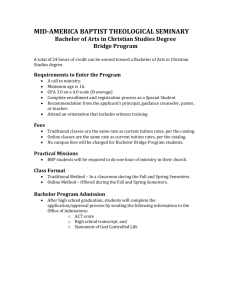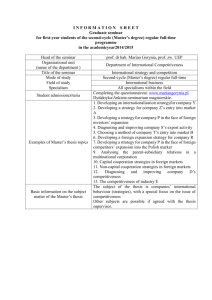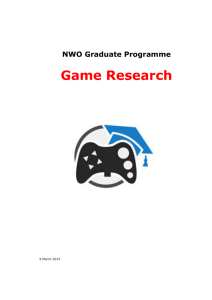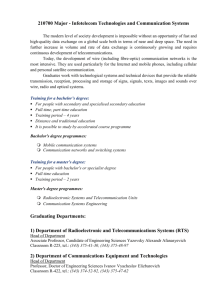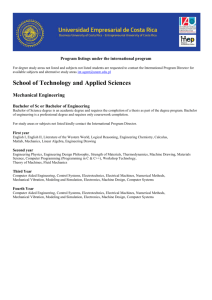NEWSLETTER
advertisement
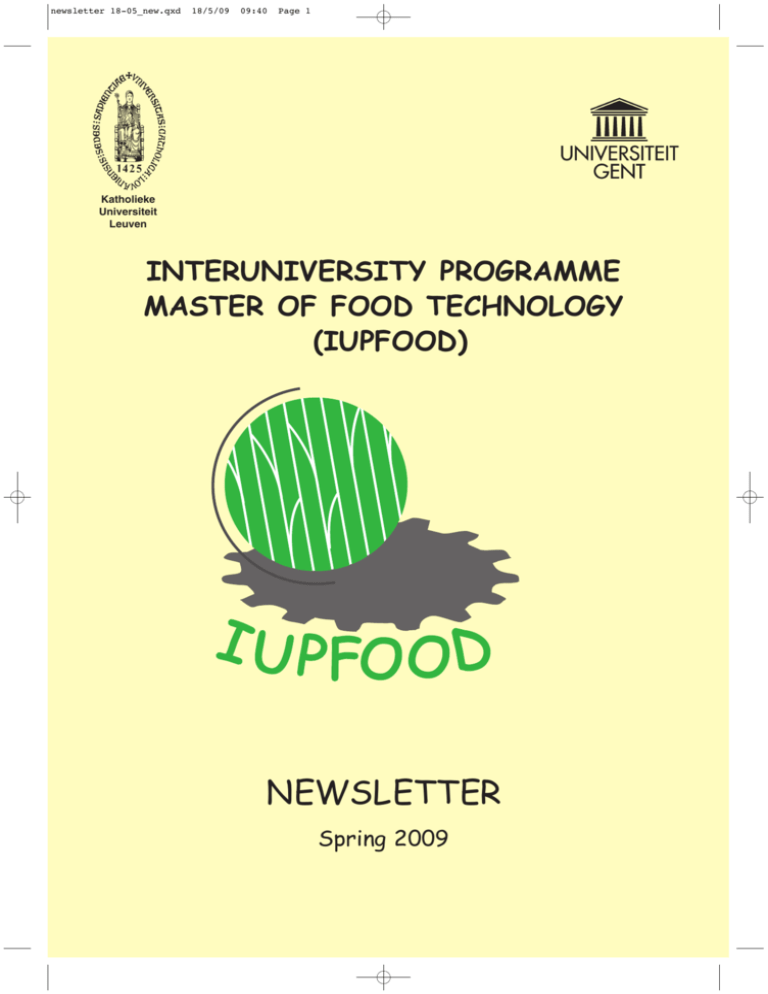
newsletter 18-05_new.qxd 18/5/09 09:40 Page 1 Katholieke Universiteit Leuven INTERUNIVERSITY PROGRAMME MASTER OF FOOD TECHNOLOGY (IUPFOOD) NEWSLETTER Spring 2009 newsletter 18-05_new.qxd 18/5/09 09:40 Page 2 Dear alumni, dear students, dear all, The time has come to present you the tenth IUPFOOD Newsletter, informing you about highlights of this year year. We hope that this jubilee edition will facilitate the interaction between IUPFOOD postgraduates, students, lecturers and the course team. This academic year we welcomed twenty four students in the first year 'Master of Food Technology'. Twenty two students started the second year of our interuniversity programme 'Master of Food Technology'. Small academic changes according to the BaMa regulation have been implemented in the second year, resulting in only one diploma being awarded after completion of the two years of study. As was the case the previous years, the current students of the IUPFOOD programme and the graduates of the past academic year will be introduced to you. Moreover, this newsletter contains an updated profile of two research laboratories involved in IUPFOOD and gives you an overview of finished PhD's of former IUPFOOD students, social activities, students' impressions and interesting newsflashes. We hope you will have a lot of pleasure in browsing through this tenth IUPFOOD Newsletter and we hope to hear from you in the near future (announcements, comments, ideas, suggestions,…)! Best regards, The course team Prof. Marc Hendrickx, Prof. Koen Dewettinck, Dr. Chantal Smout, ir. Katleen Anthierens, Ruth Van den Driessche and Katrien Verbist 2 newsletter 18-05_new.qxd 18/5/09 09:40 Page 3 STUDENTS ACADEMIC YEAR 2008-2009 1ST YEAR MASTER OF FOOD TECHNOLOGY 3 newsletter 18-05_new.qxd 18/5/09 09:40 Page 4 1st YEAR MASTER OF FOOD TECHNOLOGY 1. Mohammad Mozidul ISLAM • Born in Shaka, Bangladesh on December 29, 1981. • Obtained a Master of Science in Food Engineering at the Bangladesh Agricultural University, 2008. • Professional background: Technical Officer / Instructor on Fruit and Vegetable Preservation. • bunty1550@yahoo.com 2. Probir KUMAR DAS • Born in Barsisal, Bangladesh on January 1, 1984. • Obtained a Bachelor of Science in Agriculture at the Patuakhali Science and Technology University, 2006. • Professional background: / • probir_pstu@yahoo.com 3. Sunny George GWANPUA • Born in Limbe, Cameroon on May 22, 1985. • Obtained a Bachelor of Science in Biochemistry at the University of Buea, Cameroon, 2006. • Professional background: Researcher at the University College of Technology of Buea. • sg_005@myway.com 4. Jeffrey Bobumntang SAMA • Born in Bamenda, Cameroon on June 18, 1982. • Obtained a Bachelor of Science in Microbiology and a Minor in Medical Laboratory Technology at the University of Buea, 2005. • Professional background: First Year Master of Food technology, Researcher at a NGO. • samajeffrey@yahoo.com 5. Kalvin Muluh TANING • Born in Fomenka Pinyin, Cameroon on August 11, 1980. • Obtained a Bachelor of Science in Zoology at the University of Dschang, Cameroon, in 2003. • Obtained a Master of Science in Parasitology at the University of Dschang, Cameroon, in 2006. • muluh_taning@yahoo.com 6. Jingya SHANG • Born in Xinyang, China on Oktober 01, 1982. • Obtained a Bachelor of Science in Microbiology at the Xin Yang Agriculture College, 2000 - 2003. • Obtained a Master of Science in Molecular Biology and Biotechnology at the University of Brussel, 2007. • shangjingya@yahoo.com 7. Sandra Milena CARDENAS CARO • Born in Bogotá, Colombia on April 14, 1981. • Obtained a Bachelor in Chemical Engineering at the Universidad Nacional de Colombia, 2004. • Professional background: Chemical Engineer. • milenaveron@yahoo.com 4 newsletter 18-05_new.qxd 18/5/09 09:40 Page 5 1st YEAR MASTER OF FOOD TECHNOLOGY 8. Marcelo HIDALGO • Born in Portoviejo, Equador on September 20, 1972. • Obtained a Bachelor in Aquaculture at the University of Guayaquil, 1997. • Professional background: Quality Assurance Auditor in Tuna Fish Industry, Panama. • marcelhi@yahoo.com 9. Getachew Tolesa NEME • Born in Gedo, Ethiopia on September 29, 1982. • Obtained a Bachelor of Science in Food Science and Postharvest Technology at the Haramaya University, Ethiopia, 2006. • Professional background: Researcher at the Haramaya University. • getachewneme@yahoo.com 10. Abadi Gebre MEZGEBE • Born in Aksum, Ethiopia on February 12, 1985. • Obtained a Bachelor of Food Science and Postharvest Technology, Hawassa University, College of Agriculture. • Professional background: Graduate Assistant Hawassa University. • abadigbr46@gmail.com 11. Konstantinos STAMATOPOULOS • Born in Marousi Attikis, Greece on Oktober 20, 1983. • Obtained a Bachelor of Food Technology and Nutrition, Technological Educational Institute of Athens, 2008. • Professional background: Researcher at the Technological Educational Institute of Athens. • stamato_k@hotmail.com 12. Aikaterini MARKOULA • Born in Egio Achaias, Greece on March 19, 1983. • Obtained a Bachelor in Agricultural Biotechnology at the Agricultural University of Athens, 2008. • Professional background: / • kmarkoula@hotmail.com 13. Florica CHALLOU • Born in Tirana, Albania on November 5, 1982. • Obtained a Bachelor of Food Technology and Nutrition, Technological Educational Institute of Athens, 2008. • Professional background: Research at the Technological Educational Institute of Athens. • fl.challou@gmail.com 14. Mohammad Naser REZAEI • Born in Shiraz, Iran on September 16, 1984. • Obtained a Bachelor of Food Science and Technology at Shiraz University, 2006. • Professional background: Researcher at Shiraz University and Web Designer, Database Programmer and Graphic Designer at a private company. • infinitymaxi@gmail.com 5 newsletter 18-05_new.qxd 18/5/09 09:40 Page 6 1st YEAR MASTER OF FOOD TECHNOLOGY 15. Pet Anthony PASCUAL • Born in Los Banos, Laguna, Phillipines on June 18, 1977. • Obtained a Master of Science in Food Science and Technology at Visayas State College of Agriculture, 2002. • Professional background: Teacher and Researcher at Visayas State College of Agriculture and Leyte Normal University. • anthonpascual@yahoo.com 16. Bernard Nino MEMBREBE • Born in Baybay Leyte, Phillipines on January 19, 1982. • Obtained the diploma of Bachelor of Science in Food Technology, Visayas State College of Agriculture, Baybay, Leyte, 2001, and the diploma of Master of Arts in Science Education-Chemistry at the University of San Carlos, Cebu City, 2008. • Professional background: Chemistry, educational research and food related topics at Eastern Visayas State University, Quality Associate in private food processing company. • bernie19ph@yahoo.com 17. James Noah SSEMANDA • Born in Mpigi, Rwanda on March 19, 1981. • Obtained a Bachelor of Science in Food Science and Technology at the Makerere University, Uganda, 2005. • Professional background: Head of Food and Agricultural Laboratory (Government Organization). • jsemah193@yahoo.com 18. Nikola DJORDJEVIC • Born in Smederevo, Serbia on August 17, 1980. • Obtained a Bachelor of Science in Food Technology of Animal Products at the University of Belgrado, Serbia, 2006. • Professional background: Auditor Trainee, Belgrado, Serbia. • nikola1713@yahoo.com 19. Mesut Ozgür EDEER • • • • Born in Afyon, Turkey on February 2, 1981. Obtained a Bachelor of Science in Food Engineering at Gaziantep University, 2004. Professional background: Food Engineer. ozgur_edeer@yahoo.com 20. Geoffrey KABUYE • Born in Ssemukombe, Uganda on April 30, 1977. • Obtained a Bachelor of Science in Food Science and Technology, Makerere University, 2003. • Professional background: Standards Officer, Uganda National Bureau of Standards. • geoffrey_kabuye@yahoo.com 21. Veronica NAJJEMBA • Born in Bugolobi, Uganda on May 5, 1983. • Obtained a Bachelor of Food Science and Technology, Makerere University, 2006. • Professional background: Chemist - product stability testing, new product development, staff training and supervision, analysis of raw materials and finished products (private company). • veronicak3@yahoo.com 6 newsletter 18-05_new.qxd 18/5/09 09:40 Page 7 1st YEAR MASTER OF FOOD TECHNOLOGY 22. Anh Dung DOAN • Born in An Giang, Vietnam on March 10, 1977. • Obtained a Bachelor of Science in Food Technology at Cantho University, 2002. • Professional background: Lecturer at Cantho University, Food Technology Department. • anhdung@ctu.edu.vn 23. Thuy LE NGOC • Born in Can Tho, Vietnam on September 3, 1980. • Obtained a Bachelor of Biotechnology, at Can Tho University, 2005. • Professional background: / • Ngocthuy3983@yahoo.com 24. Thi Huong Giang NGUYEN • Born in Daklak Province, Vietnam on April 15, 1981. • Obtained a Bachelor of Food Technology at Nhatrang University, 2004. • Professional background: Research Assistant, Nhatrang University, Vietnam. • huonggiangnt@gmail.com 7 newsletter 18-05_new.qxd 18/5/09 09:40 Page 8 STUDENTS ACADEMIC YEAR 2008-2009 2nd YEAR MASTER OF FOOD TECHNOLOGY 8 newsletter 18-05_new.qxd 18/5/09 09:41 Page 9 2nd YEAR MASTER OF FOOD TECHNOLOGY 1. Francis Nkemamin NDEMAFIA • Born in Mount Buea, Cameroon on August 10, 1983. • Obtained a Bachelor of Science in Microbiology at the University of Buea, Cameroon, in 2005. • Professional background: Trainer in Agricultural and Post Harvest Management. • francis4ever2008@yahoo.com 2. Fombong TENGWEH FORKWA • Born in Kumba, Cameroon on June 01, 1981. • Obtained a Bachelor of Science in Zoology at the University of Buea, Cameroon, in 2002. • Professional background: Social coordinator for COSSEP. • zzuusss@yahoo.com 3. Marios KASINOS • Born in Larnaca, Cyprus on August 30, 1981. • Obtained a Bachelor in Agriculture at the Agricultural University of Athens, Greece, 2006. • Professional background: Research and teaching experience. • m_kasinos@hotmail.com 4. Henok Dejenie BELAYNEH • • • • Born in Shire, Ethiopia on Oktober 05, 1985. Obtained a Bachelor of Science in Agriculture (Food Science and Postharvest Technology) at the Haramaya University, Ethiopia, in 2006. Professional background: Graduate Assistant at the Bahir Dar University. hennydejfood@yahoo.com 5. Sirawdink Fikreyesus FORSIDONGA • Born in Hossana, Ethiopia on May 17, 1981. • Obtained a Bachelor of Science in Horticulture at the Jimma University, Ethiopia, 2006. • Professional background: Graduate assistant at the University College of Agriculture and Veterinary Medicine, Jimma, Ethiopia. • sirawf@yahoo.com 6. Souleymane Lansana CONDE • Born in Conakry, Guinea on April 01, 1975. • Obtained a Chemical Engineer Diploma option Food Technology, Gamal Abdel Nasser University. • Professional background: lecturer assistant of Microbiology courses, Polytechnic Institute, Conakry Guinea. • soulconde@yahoo.fr 7. Petrus PERECAYA • Born in Waiwerang, East Flores, Indonesia on Oktober 28, 1974. • Obtained a Bachelor of Science in Chemistry at the Bandung Institute of Technology, 1999. • Professional background: ceramic manufacture and assistant manager Quality Control and Laboratory, as Quality Controller for the product Quality and the whole processing in term of Quality, Jenggala Keramik, Bali. • petrus_perecaya@yahoo.com 9 newsletter 18-05_new.qxd 18/5/09 09:41 Page 10 2nd YEAR MASTER OF FOOD TECHNOLOGY 8. Myo Myo Hlaing • Born in Yenangyaung, Myanmar on February 02, 1978. • Obtained a Bachelor of Science in Agriculture at Yezin Agriculture University, Myanmar, 2002. • Professional background: Deputy Assistant Supervisor, Land Use Division Myanmar Agriculture Service. • myomyohlaing@gmail.com 9. Roman KARKI • Born in Bhaktapur, Nepal on December 30, 1979. • Obtained a Bachelor of Science in Food Technology at Central Campus of Technology, Tribhuvan University, 2002. • Professional background: Technical Officer, Food Research Unit, Nepal Agricultural Research Council, Nepal. • rmn_karki@hotmail.com 10. Kshitij SHRESTHA • Born in Dhankuta, Nepal on December 31, 1981. • Obtained a Bachelor of Science in Food Technology at the Tribhuvan University, 2003. • Professional background: Food Research Officer, Dpt of Food Technology and Quality Control, Gvnmt of Nepal. • kstha2000@gmail.com 11. Susan Bell Julia SANCHEZ ALARCON • Born in Lima, Peru on August 08, 1980. • Obtained the diploma of Ingeniero Industrias Alimentarias at the Universidad Nacional Agraria La Molina, 2002. • Professional background: Social Program Coordinator, Health-Ministry, Lima, Peru. • belljulia44@hotmail.com 12. Fabien MATSIKO • Born in Kiruhura Butare, Rwanda on December 12, 1972. • Obtained a Bachelor of Science in Food Science and Technology at the Kigali Institute of Science, Technology and Management, 2004. • Professional background: Tutorial Assistant, The Kigali Institute of Sciences and Technology. • matsiko12@yahoo.fr 13. Pratheeba YOGENDRARAJAH • Born in Jaffna, Sri Lanka on June 02, 1980. • Obtained a Bachelor of Science in Agriculture at the University of Jaffna, Sri Lanka, 2005. • Professional background: Assistant lecturer, Dpt of Agricultural Chemistry, Faculty of Agriculture, University of Jaffna. • ypratheeba@yahoo.com 14. Edna Edward MAKULE • Born in Mwanza, Tanzania on November 11, 1979. • Obtained a Bachelor of Science in Food Science and Technology at Sokoine University of Agriculture, Tanzania, 2004. • Professional background: Research assistant, Soya Project, Dpt of Food Science and Technology, Tanzania. • ednamak79@yahoo.co.uk 10 newsletter 18-05_new.qxd 18/5/09 09:41 Page 11 2nd YEAR MASTER OF FOOD TECHNOLOGY 15. Phuttatida THEPPIBOOL • Born in Bangkok, Thailand on Mai 29, 1984. • Obtained a Bachelor of Science in Food Engineering at Rajamangala University of Technology Thanyaburi, 2006. • Professional background: Research Assistant, Food Engineering Department, Faculty of Engineering, Rajamangala University of Technology Thanyaburi. • phuttatida@hotmail.com 16. Nghia NGUYEN DO TRONG • Born in An Giang, Vietnam on March 28, 1982. • Obtained a Bachelor of Science in Chemical Food Engineering at Ho Chi Minh City University of Technology, 2003. • Professional background: Lecturer. • ndtnghia@gmail.com 17. Hoang Anh NGUYEN NGOC • Born in Can Tho City, Vietnam on June 01, 1984. • Obtained a Bachelor of Science in Engineering Biological Technology at Can Tho University, 2006. • Professional background: / • canary0106@gmail.com 18. Hai Yen HA • Born in Hanoi, Vietnam on April 04, 1982. • Obtained a Bachelor of Science in Food Technology at Hanoi University of Technology, 2005. • Professional background: Lecturer. • springs304@yahoo.com 19. Mai TUYET NGUYEN • Born in Da Nang, Vietnam on April 27, 1982. • Obtained a Bachelor of Science in Engineering, Food Technology at Ho Chi Minh City University of Technology, 2005. • Professional background: Lab Technician, Dutch Lady Viet Nam Food and Beverage Company Ltd. • ngtuyetmai@hotmail.com 20. Faith Angeline MANDITSERA • Born in Mutoko, Zimbabwe on February 25, 1982. • Obtained a Bachelor of Science in Food Science and Technology at University of Zimbabwe, 2004. • Professional background: teaching Assistant, Chinhoyi University, Zimbabwe. • faymand@yahoo.co.uk 21. Jeanne Françoise DUSENGE • Born in Butare, Rwanda on January 12, 1978. • Obtained a Bachelor of Science in Food Science and Technology at the Kigali Institute of Science, Technology and Management (KIST), Rwanda, in 2004. • Professional background: Tutorial Assistant Lecturer at the Kigali Institute of Science, Technology and Management (KIST). • mamanmelissa2003@yahoo.fr 22. Mohammad Reza MIRANZADEH MAHABADI • Born in Tehran, Iran on May 6, 1972. • Obtained a Bachelor of Science in Agricultural Engineering at the Isfahan University of Technology, Iran, 1996. • Professional background: / • mohamadmiran@yahoo.com 11 newsletter 18-05_new.qxd 18/5/09 09:41 Page 12 GRADUATION 2007-2008 12 newsletter 18-05_new.qxd 18/5/09 09:41 Page 13 GRADUATION 2007-2008 Option 'POSTHARVEST AND FOOD PRESERVATION ENGINEERING' AYAFOR EUPHEMIA BI CHENWI (Cameroon) NGUYEN THI HUONG THAO (Vietnam) Thesis: Isolation and characterization of new bacterial lysozyme inhibitors Promotor: Prof. C. Michiels Thesis: Influence of butanediol fermentation on growth of Enterobacteriaceae in foods Promotor: Prof. C. Michiels BELLIDO ASPILCUETA MYRIAN (Peru) PIDERIT GONZALEZ VERONICA DANIELA (Chile) Thesis: Development of a Pressure-Temperature-Time Indicator (PTTI) system for high hydrostatic pressure processing Thesis: Ethylene metabolism in ripening tomato fruit Promotor: Prof. M. Hendrickx SHIMO PETER SHIMO (Tanzania) GEDAMU ANTENEH (Ethiopia) Thesis: Impact of high hydrostatic pressure on the quality of some acid foods Thesis: The use of reflexion spectroscopy to recognize plant tissue quality Promotor: Prof. C. Michiels Promotor: Prof. M. De Proft SHRESTHA NAGINA (Nepal) Promotor: Prof. M. De Proft HAKIMHASHEMI MARYAM (Iran) Thesis: Modelling and controlling heat production in biological processes Promotor: Prof. D. Berckmans Thesis: Recombinant xylanase B from Thermotoga maritima (rXTMB) as a candidate indicator for impact evaluation of high pressure sterilization Promotor: Prof. A. Van Loey TOLA YETENAYET BEKELE (Ethiopia) MALIMI KITUNDA EMMANUEL (Tanzania) Thesis: Thermal and high pressure stability of pectate lyase Thesis: Effect of thermal processing on the stability of vitamin C and ascorbic acid oxidase inactivation in broccoli Promotor: Prof. M. Hendrickx Promotor: Prof. M. Hendrickx WANG YI (China) NGUYEN NHAT MINH PHUONG (Vietnam) Thesis: Kinetic investigation of the stability of folate vitamers during thermal treatments Thesis: Isolation and characterization of endogenous xylanases from germinated wheat Promotor: Prof A. Van Loey Promotor: Prof. J. Delcour XIAO XIANGNU (China) Thesis: Control of three dimensional temperature distributions in storage systems Promotor: Prof. D. Berckmans Option 'FOOD SCIENCE AND TECHNOLOGY' HAILE DEMEWEZ MOGES (Ethiopia) DESSY NATALIA (Indonesia) Thesis: Lipid and colour oxidative stability of model meat products and the effect of antioxidants Thesis: The effect of different types of triglycerides on micro and macrostructural properties of fats used in confectionery coatings Promotor: Prof. S. De Smet JEDIDAH NYAMBURA WANDUTU (Kenia) Promotor: Prof.K. Dewettinck Thesis: Effect of modified atmospheres on the growth of psychrotrophic bacillus cereus in vegetable components of ready-to-eat food products PAMELA CUEVA HIDALGO (Peru) Promotor: Prof. F. Devlieghere Promotor: Prof. J. Pieters JERRY AMPOFO-ASIAMA (Ghana) EDEM ADJOA SCHWINGER (Ghana) Thesis: Effect of salt reduction and replacement on the microbiological stability and safety of food products Thesis: Do nutritional scores predict nutrient adequacy of pregnant women in rural Burkina Faso? Promotor: Prof. F. Devlieghere Promotor: Prof. P. Kolsteren MARIA CECILIA RODRIGUEZ MIRANDA (Peru) JUBILATE MWANGA MUMBURI (Tanzania) Thesis: Combined enzymatic interesterification and fractionation technologies for palm oil valorization Thesis: Assessment of seasonal variation on food and nutrient intake of pregnant women in rural Burkina Faso Promotor: Prof. K. Dewettinck Promotor: Prof. P. Kolsteren Thesis: Influence of thermal processing on fat and moisture content of meat products 13 newsletter 18-05_new.qxd 18/5/09 09:41 Page 14 GHENT University The Laboratory of Food Microbiology and Food Preservation (LFMFP) STAFF Prof Dr ir Frank Devlieghere Prof Dr ir Mieke Uyttendaele Post-doctoral co-workers : 6 Pre-doctoral co-workers : 17 Technical staff : 11 Website : http://www.foodmicrobiology.ugent.be/ RESEARCH ACTIVITIES The Laboratory of Food Microbiology and Food Preservation (LFMFP-UGent) of the Dept of Food Safety and Food Quality of Ghent University integrates several aspects of Food Microbiology and Food Preservation: microbiological food safety, food quality and the interaction thereof. Also technological/processing conditions and product formulation as well as concepts on quality assurance in the food chain are studied. Prof. Frank Devlieghere covers aspects of Food microbiology and food preservation such as new mild preservation methods, decontamination of foods, packaging of food products, predictive microbiology, chemical preservation, microbial spoilage mechanisms in foods whereas Prof. Mieke Uyttendaele covers aspects of Microbial analysis of foods and food safety which provides the basis for microbial risk assessment to support decision making by risk managers. The combined knowledge is also used for the elaboration and measurement of the performance of food safety management systems (e.g. GMP, PRP, HACCP, quality assurance standards as ISO 22000, BRC) in the agro-food supply chain. The LFMFP delivers also services towards the European food industry. It is accredited (n° 073-T) by BELAC (member of EAL) for microbiological food and water analysis according to ISO 17025. 14 newsletter 18-05_new.qxd 18/5/09 09:41 Page 15 K.U.Leuven Flanders Centre of Postharvest Technology - MeBioS Postharvest Research Group STAFF Head: Prof. Bart Nicolaï Postdoctoral fellows: 7 Doctoral students: 13 Administrative and technical staff: 8 MSc students: 3 INTRODUCTION The quality of fruit and vegetables is essential to the Belgian horticultural sector. It is therefore important to produce, store and commercialise these products in ideal conditions. The non-profit organisation Flanders Centre of Postharvest Technology (VCBT) has been established in 1997 as a collaborative project between the Association of Belgian Fruit and Vegetable Auctions and the Catholic University of Leuven. Its mission is to provide technological advise and extension related to storage technology and quality of fruit and vegetables to producers and co-operatives. Since 2004 the VCBT is officially recognised as experimental station. To support these activities, the VCBT carries out both practically oriented as well as fundamental research related to these themes. The VCBT has a unique refrigeration infrastructure for controlled atmosphere storage research and a large laboratory with advanced measurement techniques for all quality attributes of fruit and vegetables. The VCBT closely collaborates with the Postharvest Group of the division BIOSYST-MeBioS of the Catholic University of Leuven which carries out fundamental research related to storage and quality of horticultural produce. As both groups are housed in the same building, the conditions are ideal for mental cross-fertilisation between university researchers and those of the VCBT. Further, the VCBT closely collaborates with all other experimental stations in Belgium and with research groups all over the world. INFRASTRUCTURE The Flanders Centre of Postharvest Technology operates a modern pilot plant for refrigeration technology, including 4 cool rooms for storage of fruit under ultra low oxygen conditions (ULO), and 3 conventional cool rooms. In the ULO-cells the oxygen and carbon dioxide concentration as well as the relative humidity and temperature can be controlled. The refrigeration plant is based on an indirect cooling system based on a glycolwater mixture which allows to mimic different systems which are used in practice (direct Containers for storage under Flavour analysis of tomato by means of SPME/GCMS expansion, pump circulation, over or under controlled atmosphere dimensioning). The three conventional cool rooms are equiped with 10 controlled atmosphere containers each with individual control of gas composition and temperature. temperatuur. In addition, 30 plastic bags with individually controlled atmosphere conditions are available. The group has a state of the art laboratory with various measurement instruments including 2 GCs, 3 GCMS systems, HPLC, 2 NIR spectrophotometers, 3 universal testing machines, 2 colorimeters, an electronic nose, a shaker and several camera equiped microscopes. 15 newsletter 18-05_new.qxd 18/5/09 09:41 Page 16 CFD calculation of velocity profiles in a cool room RESEARCH To support the technology consultancy and extension services of the VCBT, both applied and basic research is carried out. The research aims at applying advanced engineering techniques to improve the storage life and quality of fresh fruit and vegetables by means of appropriate storage technologies and supply chain management. Applied research focusses on the solution of problems related to storage or quality of fresh fruit and vegetables on a short or intermediate time horizon. These problems can be forwarded by horticultural auctions and producers to the technology consultancy and extension services of the VCBT, or announced at six-monthly meetings of the fruit and vegetable producers councils. Dissemination of research results to producers, demonstration and follow-up is essential. Typical research topics include the determination of optimal storage conditions of fruit and vegetables, support to commercial quality labels, new packaging materials, novel methodologies to measure quality objectively. Practical relevance is essential. Basic research aims at improving our understanding of the metabolic processes of fruit and vegetables during storage, and developing new methodologies to measure and monitor postharvest quality changes. This research is strategic and technology-driven. A first line of research aims at developing new techniques to measure and predict quality changes in the postharvest chain.We are concentrating on texture, flavour and health components. Special emphasis goes to the development of high-throughput and nondestructive techniques such as acoustic methods for firmness, near infrared spectroscopy for taste components and electronic noses for aroma. Mathematical modelling techniques are used extensively to describe and predict quality changes during the supply chain, and we are specifically studying the effect of biological variability on model predictions. A second line of research focuses on postharvest physiology. Fruit are often stored at low temperature under controlled atmosphere conditions to reduce their respiration rate and, hence, extend their storage life. When the O2 and CO2 partial pressure is too low or too high, respectively, physiological disorders may occur. Conference pears, for example, are susceptible to core breakdown during controlled atmosphere storage. This storage disorder is characterised by the development of brown tissue which will further develop into cavities so that the fruit can no longer be commercialised. It involves gas and water exchange of the fruit with its environment as well as metabolic changes at the cellular level. We are adopting a computational biology approach to study this model system in which we both consider biophysical processes such as gas and water transport and mechanical deformation, as well as biochemical 16 newsletter 18-05_new.qxd 18/5/09 09:41 Page 17 processes associated with respiration. To account for the multiple spatial scales involved in these processes we are adopting the multiscale modelling paradigm. Such models essentially are a hierarchy of submodels which describe the biophysical processes at different spatial scales, from individual cell to entire fruit and even cool room, in such a way that the submodels are interconnected. Biochemical processes are studied via metabolic network models, and we are applying metabolomics and proteomics techniques to gather supporting data on metabolic fluxes in cells and mitochondria under different gas conditions. The VCBT collaborates closely with the MeBioS division of the Katholieke Universiteit Leuven on basic research. WEB www.vcbt.be Synchrotron tomography images of the intercellular space of pear tissue; the internal air space (“int”) is in blue; a stone cell is clearly visible at the right of the image (“bra”). 17 newsletter 18-05_new.qxd 18/5/09 09:41 Page 18 SUMMARY PhD Computer generation of virtual pome fruit parenchyma tissue Transport processes of gas and moisture are amongst the most important physiological processes in fruit during postharvest storage. Both experimental and modeling approaches have been followed to investigate the relationship between the gas concentration, gas diffusion, respiration and physiological disorders in apple and pear. Experimental approaches are, however, costly, tiresome and time consuming. Moreover, there are no non-destructive techniques to measure the internal gas concentration in the fruit to investigate the time course of the physiological disorders experimentally. This calls for the need for modeling these processes in fruit. Geometrical models for fruit at different relevant scales are indispensable for this purpose. Because of their complexity, numerical solutions based on the finite element or volume method are mandatory. The challenge to such modeling approach lies on the geometric representation of complex biological systems. Although such models are available for individual fruit, this is not the case for fruit tissues which can be considered as porous media consisting of pores and cluster of cells. Geometrically, this porous medium can be described as a network of pores and a tesselation of polygons, known as Voronoi diagrams or truncated ellipsoids, which represent the clusters of cells. The main objective of this work was, therefore, to develop virtual tissue generators that are used to produce representative virtual tissue of different pome fruit tissues. In this respect, the actual geometry of the pore space and aggregate of cells was derived from microscopic images and X-ray computed tomographic images. Algorithms to quantify microstructural geometrical properties and generate representative virtual tissues defining the aggregates of cells and interconnection of pore space were developed. The geometric models were interfaced with finite element and finite volume geometric modeling softwares via novel interfacing algorithms. The representative tissue geometries were also successfully exported into finite element and finite volume codes to perform computer simulations to calculate gas and moisture transport with multiscale models. KULeuven, November 27, 2008 Hibru KELEMU MEBATSION Promotors: Prof. B. Nicolaï, Dr. Ir. P. Verboven 18 newsletter 18-05_new.qxd 18/5/09 09:41 Page 19 SUMMARY PhD Engineering design of spraying systems for horticultural applications using computational fluid dynamics Spraying systems are used extensively in horticulture both during the preharvest as well as the postharvest stage. This study considers air-assisted orchard sprayers and cold storage humidification systems. During the application of pesticides using air-assisted orchard sprayers, environmental contamination and an increase in production cost due to off target deposition of pesticide chemicals and low biological efficacy are common problems. Humidification during long-term cooled storage of fruits is being introduced into practice to prevent excessive moisture loss and quality degradation. However, maintaining the required high relative humidity (RH) with mi-nimum deposition of the sprayed water droplets on the product and room surfaces is very challenging. The droplets that are deposited on the product surface may favour the growth of micro-organisms, and at sub-zero storage temperatures this water may freeze and decrease the coo-ling efficiency of the room by obstructing the circulation of the cooling air. The overall aim of this work was to study the optimal design and operation of the sprayers. To this end, a three dimensional (3D) computational fluid dynamics (CFD) model that is capable of predicting the relevant parameters has been developed. The path of sprayed droplets was tracked using an Eulerian-Lagrangian particle tracking multiphase flow model. The model considers the dispersion of the droplets due to turbulence, droplet evaporation and two-way coupling for the exchange of momentum, heat and mass between the continuous air phase and the discrete droplet phase. As inputs for the model, appropriate properties of the continuous air phase and nozzle characteristics were applied. The model required velocity, direction, temperature and RH of the continuous air phase at appropriate boundaries of the system. The characteristics of spray nozzles that were required include nozzle type and size, droplet size distribution, droplet velocity, liquid pressure and flow rate, and spray angle. For modelling cold storage humidification systems, the stored product was taken as a porous media. The pressure loss coefficients were calculated using a novel approach of explicit combined discrete element (DE)-CFD simulation. In general, a good agreement between measured and predicted results was found. In air-assisted orchard sprayers, air and spray flow distributions are affected by sprayer design, fan speed, sprayer driving speed and nozzle characteristics. The efficiency of cold storage humidification system is affected by nozzle pressure, vertical nozzle position and angle, number of nozzles, cold store design, stacking height and duration of humidification. This research showed the applicability of CFD to study different design and operational parameters of air-assisted orchard sprayer and cold storage humidification systems. For the two applications at hand, we have demonstrated that a CFD approach is required to solve design and engineering questions, which could not be answered by other means in an equally efficient way. KULeuven, January 26, 2009 MULUGETA ADMASU DELELE Promotors: Prof. Dr. Herman Ramon, Prof. B. Nicolaï, Dr. Ir. P. Verboven 19 newsletter 18-05_new.qxd 18/5/09 09:41 Page 20 SUMMARY PhD Multiscale Modelling of Gas Transport in Fruit during Controlled Atmosphere Storage Respiratory gas exchange of plants with their environment is essential for metabolic processes. In some fruits such as pears, which are typically stored under a controlled atmosphere with reduced O2 and increased CO2 levels to extend their commercial storage life, low O2 conditions inside the fruit may occur, eventually, lead to physiological disorders such as browning. Quantification of the gas exchange of the intact fruit with the storage atmosphere and prediction of the local intra-cellular gas concentration at the cellular level is essential for study such storage disorders. The main objective of this research was to get a better insight in the physical gas transport processes inside a fruit and their effect on the risk of physiological storage disorders. Towards this end, a multiscale gas transport approach was developed. Conference pear was chosen as a model system. Multiscale gas transport models are basically a hierarchy of models which describe the gas transport phenomena at different spatial scales. A macroscale model was constructed to study gas exchange of intact pear with external environment. This model does not incorporate microscopic feature of the tissue. A microscale model of O2 and CO2 exchange was developed to take into account the gas transport through the intercellular space, the cell wall complex and the cytoplasm of the microstructure of tissue. The model was used to perform in silico analysis of local gas concentrations and fluxes. The model equations were solved using advanced computer algorithms. A multiscale model was used to analyse the effect of different external air conditions at the storage temperature on gas transport inside the fruit. The multiscale approach provides a much better insight in the mechanism of gas transport in pear fruit and tissue in general, and a quantitative explanation of the development of physiological disorders such as core breakdown. KULeuven, December 19, 2008 QUANG TRI HO Promotors: Prof. S. Vandewalle, Prof. B. Nicolaï, Dr. Ir. P. Verboven 20 newsletter 18-05_new.qxd 18/5/09 09:41 Page 21 SOCIAL ACTIVITIES SOCIAL ACTIVITY IUPFOOD - NOVEMBER 25, 2008 Unlike other years, a rainy day was the scenery for the IUPFOOD social activity. Not that it could spoil the fun! The second year students already knew what was coming. For some of the first year students, it would be their first time at the bowling lane. Everybody seemed to enjoy the game! After bowling, everybody could enjoy - for many students for the first time - the delicious taste of a real Belgian pancake. 21 newsletter 18-05_new.qxd 18/5/09 09:41 Page 22 NEWS FLASHES The following graduates have finished their PhD: Quang Tri Ho (graduate of 2003) - 'Multiscale Modelling of Gas Transport in Fruit during Controlled Atmosphere Storage' Hibru Kelemu Mebatsion (graduate of 2004) - 'Computer Generation of Virtual Pome Fruit Parenchyma Tissue' “I am Nguyen Thi Thao, I attended the IUPFood course from 2000 to 2002 under the supervision of Prof. A. Huyghebaert and Dr. Stephan Dierckx. After finishing MSc at Ghent University, I came back to Vietnam and worked as teaching staff at Hanoi University of Technology. The study at IUPFood gave me a strong background to continue my research on Food Science and Technology and I appreciate that time in Belgium very much. I started my PhD in Food Science from Oct. 2005 at Ehime University, Japan and received my degree on 24th Sept 2008. My thesis was "Studies on the Characterization of Citrus Essential Oils by Isotope Ratio Analysis Using GC-MS". Now I am back at Hanoi University of Technology and became lecturer at the Department of Food Quality Management and Tropical Food Technology. I also got married to Mr. Nguyen Thanh Tuan in 2004 and now we have one boy, Nguyen Xuan Viet (4 year old). I am sending herewith my latest photo.” Births Eugénie Doungla N. (IUPFOOD Graduate 2006), her husband Bertrand Fomekong K. and their children Faith Diane and Elvis Divine proudly present their lovely daughter and little sister Hope Joanne Fomekong Zome, who was born in Leuven, Belgium on July 18, 2008. Euphemia and her husband Jacob Ayafor (IUPFOOD Graduate 2008) are happy to anounce the birth of their twin girls Corey Abimnwi Ayafor and Jacey Miyanwi Ayafor. NGUYEN THI THAO, PhD, Graduate 2002 The following graduates have recently started a PhD: Jerry Ampofa (graduate of 2008) - 'Dynamics in the central plant cell metabolism', KULEUVEN, Department of Biosystems (BIOSYST), Division of Mechatronics, Biostatistics and Sensors (MeBioS) Justice Asomaning (graduate of 2007) - 'The Phase Behaviour of the Binary 1,3-dipalmitoyl-2-stearyl-sn-glycerol (PSP)/ tristearin (SSS) System and a Ternary System containing PSP-SSS + one other TAG to be determined', University of Alberta, Canada Marriages “I'm very happy to inform you that I've just got married on July 26th, 2008 du-ring the summer vacation. My husband is VU Pham Viet Hai. He is now working for a bank in Vietnam. Our wedding after 8 years in love brings endless happiness to our family and to ourselves. It's my pleasure to share our happiness with you all in the IUPFOOD Newsletter”. Ha Hai Yen, IUPFOOD second year student 22 Jacey Corey “I am very glad to inform you about the delivery of our lovely daughter, Zanetah Mukisa. Zanetah was born on Friday, October 10, 2008 at 9:45 am in Uganda. Both mother and child are quite fine. Attached is a photo of Zanetah, in sleep mode! My wife and I are very grateful for all of you that have been with us in prayer. We also thank all those that have supported us emotionally. May God bless you equally”. Ivan Muzira Mukisa, Graduate 2007 We are very happy and grateful to inform you that on February 15, 2009, Katleen Anthierens (Scientific Responsible IUPFOOD UGent) and Eddy Decaesteker became the proud parents of a little daughter, Mare. Marriages Edward Suyata (IUPFOOD graduate 2007) got married to Ria Dhian Anggreni (IUPFOOD graduate 2007) on December 27, 2008 in Jakarta, Indonesia. The IUPFOOD program gives way to friendships across borders. Sanne Rom (IUPFOOD graduate 2007) was present at the wedding! New IUPFOOD team member From August 2008, Katrien Verbist has taken on the administrative duties at KULeuven. newsletter 18-05_new.qxd 18/5/09 09:41 Page 23 STUDENT'S REFLECTIONS An extract of “How my life and the destiny of a whole nation changed”, based on a true story written by SAMA Jeffrey BOBUMNTANG (1st year student). It was Tuesday September 15, 2008. We had just touched down the Brussels International Airport, Belgium. It was hardly half past seven, though very bright, it was very cold. Very precise and illustrative as the Vlaamse Interuniversitaire Raad (VLIR) and Interuniversity Programme Food Technology (IUPFOOD) instructions were, we paved our way towards the underground train station to board a train for Gent Sint Pieters. Definitely, the ocean of excitement had overflown the tiredness from the tedious journey. We just could not deny ourselves the immense pleasure of getting uncountable photographs of this relatively more beautiful and heavily illuminated environment we had just found ourselves in. It was actually the first time we ever left Africa for Europe. Silently in my mind like a song I unconscientiously did not stop to repeat the phrase “Thank God for the VLIR and IUPFOOD” but it was short-lived. Deeply lost in admiration, and not too time-conscious as in our Africa, we missed the train which had our luggage. We immediately divided ourselves into pairs to the three train stations in Brussels. Believe me: it was not the best way to discover the Brussels North, Central and Midi stations. It was only during this boring search that we really discovered how tired we were from the journey. In all the confusion we hardly noticed one of us was also missing. Fortunately, he had stayed back in the train while we sluggishly went to bring a part of our luggage. Finally we reunited, found our luggage and the joy continued to flow. Members (Katleen, Ruth,...) of the very hospitable, welcoming and concerned IUPFOOD team had been very worried about us, but we just arrived at Gent's Sint Pieters station before it was too long. We were warmly received, all one could summarise all this as a royal welcome. In less than no time we had fulfilled nearly all the administrative formalities and before sun set we had all gained access to our rooms where we caught adequate rest and privacy. The planning was superb. Time passed so quickly, gradually we adapted, lectures also had begun. We enjoyed every bit of our studies especially with the developed e-learning facilities. We too became use to some words like the Minerva and even cracked jokes of our Food Chemistry teacher who repeatedly used the expression “Ladies and Gentlemen…” in his particular style. It was obvious we also had to learn bitter lessons: I had been tricked once to put some Euros in a car park machine hoping to receive a bus ticket, helpless as I was unable to read the Dutch language; others had bought articles that cost up to five times their price from relatively more expensive shops without knowing their cheap alternatives and many other stories. It became even more interesting with an unprecedented curiosity for the methods of preservation, possible suitable products that can be made out of, how to market, possible spoilage mechanism for any food material I saw around me and even many more questions than those I could just answer. Gradually I see my hopes grow and some being realised, I feel inspired, I see myself accomplishing studies in the Flanders, I already dream of making things happen at home especially as studying is building the most solid foundation. You might like to know how this story ended, stay tuned and watch out for the next edition of the IUPFOOD newsletter! 23 newsletter 18-05_new.qxd 18/5/09 09:41 Page 24 KATHOLIEKE UNIVERSITEIT LEUVEN FACULTY OF BIOSCIENCE ENGINEERING CENTRE FOR FOOD AND MICROBIAL TECHNOLOGY Kasteelpark Arenberg 22, PO box 2457, 3001 Heverlee, Belgium Phone: +32-16-32.14.09, Fax: +32-16-32.19.60 e-mail: iupfood.postharvest@biw.kuleuven.be Academic responsible : Prof. M. Hendrickx UNIVERSITEIT GENT FACULTY OF BIOSCIENCE ENGINEERING DEPARTMENT OF FOOD SAFETY AND FOOD QUALITY Coupure Links 653, 9000 Gent, Belgium Phone: +32-9-264.62.10, Fax: +32-9-264.62.22 e-mail: iupfood.technology@UGent.be Academic responsible : Prof. K. Dewettinck http://www.iupfood.be VLIR - UOS Bolwerksquare 1A, 1050 Brussel, Belgium Phone: +32-2-289.05.50, Fax: +32-2-514.72.77 e-mail: info@vliruos.be Internet: http://www.vliruos.be


